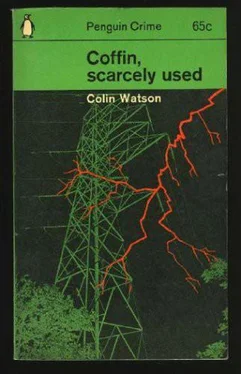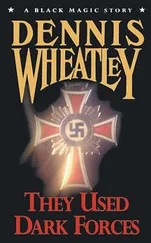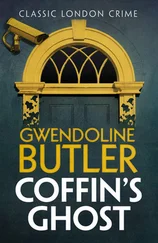“Can you tell me what they do represent?”
After the briefest of pauses, Gloss shook his head. “No, inspector, I’m afraid I cannot help you there.”
“You appreciate, I expect, sir, that the fact of Mr Gwill having been murdered obliges us to examine everything about his affairs that might show a motive.”
“Do I take it that you infer from the existence of an unofficial source of income that he might have been obtaining money by exerting pressure on some person?”
“I infer the possibility of blackmail.”
Gloss pursed his lips. “That is what I imagined might be your line of reasoning. But do you think that if that had been the case my client would have acquainted me with the extent of his investments? He need not have done so.”
“Nor need you have said anything about them to me, sir.”
“No, but I think it safer that I should.”
“Safer? Safer for whom, Mr Gloss?”
“For myself, inspector. I shall be entirely frank with you. It is my private belief that this money was obtained not by blackmail but by other means of questionable legality. What they were I do not know and I do not wish to know. But some months ago I noticed a change in the man’s manner. He became more excited, yet there was an element of fear in his excitement. He boasted of the supplements to his means and hinted at his having to be clever to obtain them. The sums themselves, as far as I have been able to check, were not spectacular. I think it was the method of coming by them that gave him some sort of stimulus. I further received the impression that some third person was being deprived of a share in the gains and that his discomfiture was contributing to my client’s sense of elation.”
“You felt Gwill was doing something dangerous, you mean? For the thrill of it?”
“Exactly. These little extras had been coming his way for a fairly considerable time, but he had said nothing about them to me, apart from asking advice on investment occasionally.”
“Which you gave?” Purbright interjected.
“Oh, yes. Why not? I had no proof of my client’s transactions being in any way improper.”
“Please go on, sir.”
“Well, during recent months he grew more loquacious. Not factually informative, you understand, but full of little hints and boasts of a slightly provocative character. He seemed anxious that I should feel involved in some way. I remember he said once that I should need to be careful for my own skin—that was how he put it—for my own skin, if ever anything happened to him. I asked him what he meant and he said something to the effect that he had made an enemy ‘good enough for us both’. To be quite honest, I had come by that time to suspect my client of being considerably overwrought and perhaps lacking balance.”
“You think now there may have been something in what he said?”
Gloss got up and walked to the window. With his back to Purbright, he went on talking as he stared out at the passing traffic.
“I am inclined to the view,” he said, “that Gwill said what he did after having conveyed for reasons best known to himself a false impression of our relationship to some other person. This hypothetical third party, it may be, was fobbed off with the story that I had been given custody of monies of which he had been deprived, in order that he would make no direct or violent attempt to recover them from Gwill himself. As things have turned out, it appears that the ruse did not save Gwill from the revenge of the person he had provoked. But what very naturally concerns me, inspector, is that someone who has shown himself capable of murder is now at large and possibly obsessed with the notion that only I now stand between him and what he considers his due.”
At the end of this speech, Gloss turned slowly from the window and stood facing Purbright. “I trust,” he said, “you will now appreciate why I made the request—of which your Chief Constable has doubtless acquainted you—for police protection; and why I have disclosed to you what would normally be regarded as professionally confidential matters.”
Purbright rubbed his chin and sighed. He found the ponderous rectitude of Gloss’s recital tiring and an obstacle to his selection of suggestive facts.
“I wonder,” he said at last, “if you would care to tell me where you were on Monday night, Mr Gloss?”
The sudden change of subject seemed to set the solicitor thumbing hastily through some mental brief. “Monday night...Monday...”
“Yes. The night Gwill was killed.”
“Ah...” The court manner was returning. Some surprising revelation, clinching a case, confounding a prosecutor, vindicating a wronged client, was about to be tossed, with studied carelessness, before the bench. “Curiously enough, inspector”—Gloss slowly lowered himself back into his chair and gazed earnestly over interlaced fingers held just above his chin—“I spent Monday evening at the home of Marcus Gwill and stayed until after he was dead.”
Chapter Eight
“I suppose you would think me facetious if I were to ask if you killed him,” Purbright said.
“Not at all: the question is a proper one in the circumstances,” Gloss conceded. “But I’m afraid my answer will not help you very much. It is no.”
Purbright took out a notebook. “I’m my own secretary today,” he remarked wryly. “I hope you won’t be put off by feeling sorry for me, but I really must take a statement after what you’ve just said.”
“Naturally. I have given the matter some thought and I feel that to give a frank account of what I know of the events of the other evening is the least I can do for the sake of my late client and”—Purbright looked up in time to see a man-of-the-world shrug—“of others.”
“Yourself included, sir?”
“Of course.”
“And Jonas Bradlaw?”
Gloss held up his hand. “You must not anticipate my statement, inspector.” He looked at his watch and listened. Above the muffled sounds of traffic, a horn sounded briefly. A ship’s siren moaned in the estuary beyond Flaxborough dock. There was a light step to the door, a knock, and a plump, spotty girl edged her way in with a tray. Gloss put away his watch and beamed a quick, unmeant smile at her. “Promptitude,” he said to Purbright when she had gone, “is one of the qualities most difficult to inculcate into one’s office staff today.”
Purbright grunted and put his cup on the desk beside him. He opened the notebook and looked expectantly at the solicitor, who took a sip of his tea and began slowly to dictate.
“Rather late on Monday night—it must have been approximately eleven-thirty—I left my home and walked to the house of Mr Marcus Gwill. I do not normally retire to bed early and a stroll about midnight is not an uncommon exercise for me, so you must not imagine that there was anything extraordinary in my being abroad on that particular night. I do not pretend, however, that the visit to Gwill was in response to a mere whim. He had telephoned me a short time previously and intimated that there was a matter of some urgency he wished to discuss.
“I recall nothing noteworthy about my walk along Heston Lane. I met no one I recognized, although there were several people about who might conceivably have recognized me. It would be about a quarter to twelve when I arrived.
“Another acquaintance of Gwill’s was already there. I say acquaintance; actually it was his doctor, the Scotsman Hillyard, whom you probably know. Like myself, he stood in a somewhat closer relationship to Gwill than a purely professional one. When I found him in the drawing-room, I concluded that some sort of a conference was intended, although Gwill had not explained over the telephone what he had in mind. I did not suppose the occasion to be of a purely social nature.”
Читать дальше












